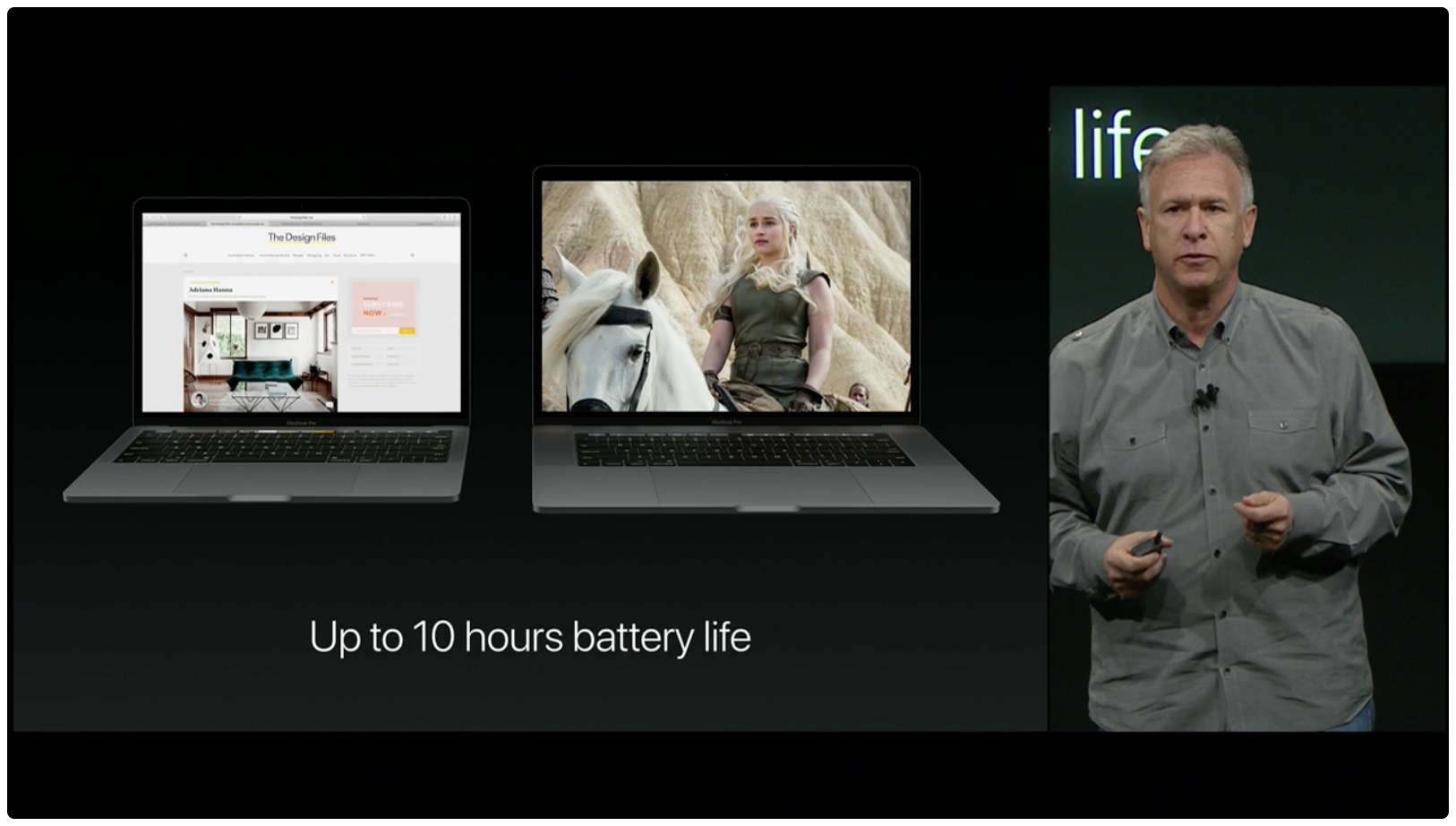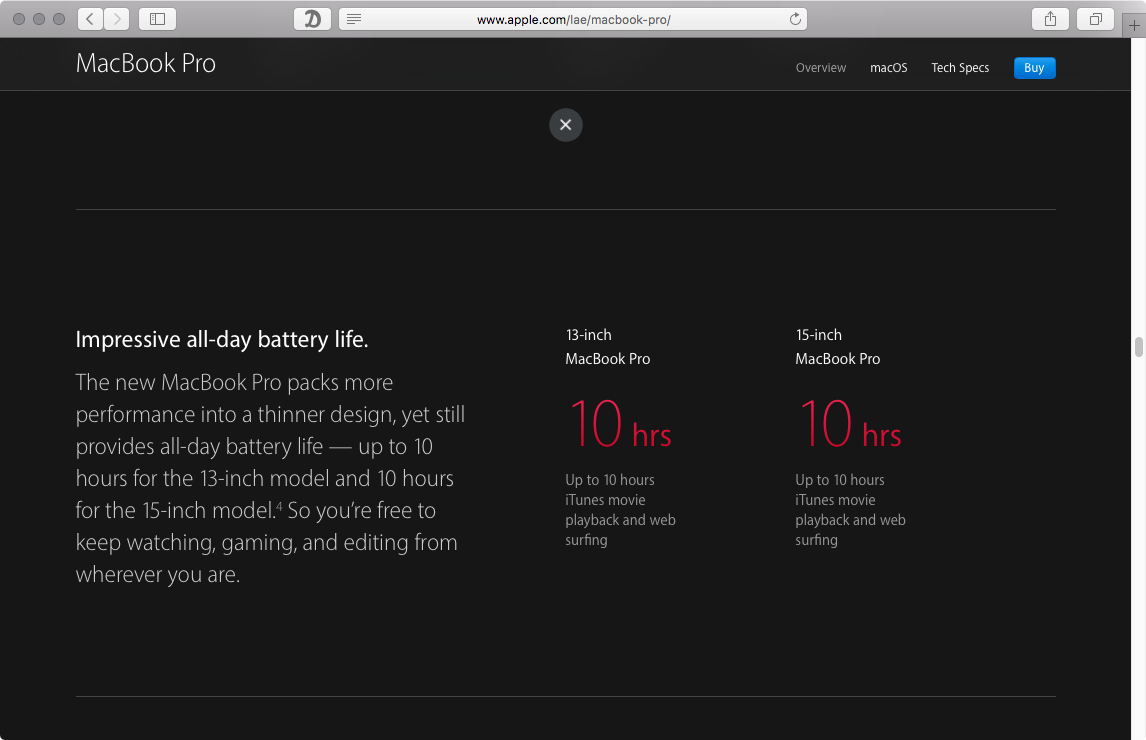Consumer Reports will not be recommending Apple’s latest MacBook Pro models due to inconsistent battery performance, the magazine said Thursday. After conducting a battery of tests, Consumer Reports discovered that battery life across all new Pros varied “dramatically” from one test to another.
On the other hand (as I note in this article), the battery woes might be caused by a software issue in Safari for Mac because Chrome (a notorious battery hog) fared far better in the tests.
Be that as it may, Apple’s latest notebooks received low rating and failed to earn Consumer Report’s recommendation “after battery life issues surfaced during testing”. As a result, the new MacBook Pro is the first Apple notebook that did not receive a Consumer Reports recommendation, said the magazine.
Each late-2016 MacBook Pro model underwent through a series of three consecutive tests. The 13-inch MacBook Pro with Touch Bar had a run time of 16 hours in the first trial, which dropped to 12.75 hours in the second and just 3.75 hours in the third.
As for the 13-inch MacBook Pro without Touch Bar, that model worked for 19.5 hours in one trial but only 4.5 hours in the next. The numbers for the 15-inch MacBook Pro with Touch Bar ranged from 18.5 down to 8 hours.
“Those were just a few of the results,” said Consumer Reports, adding that they tested battery life on these laptops “repeatedly”. Apple declined to comment on these numbers beyond saying in an email statement that “any customer who has a question about their Mac or its operation should contact AppleCare.”
The battery tests involved loading ten different web pages sequentially in Safari from an office server over a Wi-Fi network set up specifically for this purpose until the machine ran out of juice. Each laptop’s screen remained on during the tests and brightness was set to 100 nits, “a typical level you might use indoors or out.”
Automatic brightness adjustment was turned off in System Preferences.
The magazine summed it up by saying:
With the widely disparate figures we found in the MacBook Pro tests, an average wouldn’t reflect anything a consumer would be likely to experience in the real world. For that reason, we are reporting the lowest battery life results, and using those numbers in calculating our final scores. It’s the only time frame we can confidently advise a consumer to rely on if he or she is planning use the product without access to an electrical outlet.
I’m only speculating here, but these battery woes might be caused by a software issue in Safari because Consumer Reports conducted the same tests using the Chrome browser only to find battery life was “consistently high on all six runs.”
That’s a major surprise—Chrome’s always been a battery hog on Mac because it doesn’t use a number of battery-related optimizations found in Safari. Chrome hasn’t affected the ratings because Consumer Reports only used the default Safari browser to calculate its final scores.
The Consumer Reports magazine is published since 1936 by Consumers Union, a nonprofit organization dedicated to unbiased product testing, so this is obviously a major blow to Apple and a signal that the company should perhaps take a closer look into complaints from consumers about inconsistent battery life.
“The laptops did very well in measures of display quality and performance,” said the magazine. As you know, Apple advertises the new Pros with a ten-hour battery life.
Complaints about inconsistent battery life have been popping up online since the machines first went on sale in November. Some people said on Twitter and Apple’s support forums that they were only able to use their brand spanking new Pros for three to four hours before the battery ran down.
Some of the reported battery issues can be chalked up to post-install process, like Spotlight indexing, iCloud data sync, iCloud Photo Library sync, the Memories feature and the new facial, object and scene algorithm in Photos.
After Apple removed the battery’s time remaining indicator from the menu bar in the latest macOS Sierra 10.12.2 software update, some but not all affected users did report better-than-before battery life when they deployed the software update.
For what it’s worth, Consumer Reports did repeat the battery tests using macOS Sierra 10.12.2 after it was released, but saw no difference in the results.
Apple specifically told ArsTechnica that it took no specific steps with macOS Sierra 10.12.2 to improve battery life on the new MacBook Pros.
That being said, any potential battery life improvements you might see could be contributed to the recently finished post-install processes (which may take a few days to complete), causing the notebook’s battery life to normalize.
The Cupertino company told The Loop’s Jim Dalrymple that “after a lot of testing” it continued to stand behind the Pro’s advertised ten-hour battery life when browsing the web or watching iTunes movies.
Source: Consumer Reports

